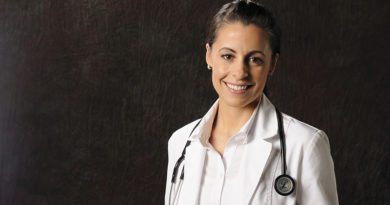Sugar, white flour, a recipe for IBS
By Dr. Antony W. Martin DC, Phd, RNCP, DNM
Whenever a doctor gives you a diagnosis of IBS or irritable bowel syndrome it usually means
that they really do not know what is wrong with you. It is easy to say “you have an irritable bowel,” but the real question is “What is causing your bowel to be irritated and even more important is what to do about it?”
It is estimated that 30 to 40 per cent of the population (that is modest in my estimation) have trouble with the plumbing (bowel). Unfortunately, the old adage “What happens in Vegas stays in Vegas” does not apply to the gut. What happens in the gut rarely stays only in the gut and can have a negative impact on all your organs, especially the brain.
Causes of lBS
Here is a list of the top major causes of IBS:
1) The overuse of antibiotics.
Antibiotics are the greatest discovery in medicine of the 201h century and have become the curse
of the 21st century. Just one five-day antibiotic treatment can absolutely destroy the normal flora of your gut, causing major digestive issues. It never ceases to amuse me how often I see this. I ask the question “When did your digestive issues start?” The answer is often several months after
an antibiotic treatment for a routine bladder, sinus or chest infection. Often children with
reocurring ear infections develop digestive issues (IBS) later in life.
2) Stress
High-cortisol secretion (stress hormone) again changes the gut’s micro flora. This leads to
dysbiosis (a yeast or candida overgrowth) which can be a huge contributor to IBS. Prolonged stress diverts blood supply from the gut to muscles in your arms and legs to respond to the flight
or flight hormone.
3) High-carb diet
A high simple carb diet made up of white flour and especially sugar once again feeds candida
(yeast) disrupting the normal bowel lining, causing constipation, or diarrhea and bloating. Carbs are like sponges. For every gram of carbohydrate consumed your bowel hold on to four grams of fluid.
4) Food sensitivities
Food intolerances are especially common to day. With the prevalence of GMOs, high-gluten
diets ( carb loaded) and environmental toxins such as herbicides, pesticides and fluoride in the water can create havoc in the digestive tract.
The three big food sensitivities are to gluten, dairy and eggs. I often start IBS patients on a high-fat low-carb diet, primarily to get the gluten out of their diet and to take some burden off the gut.
Again everybody has a different finger print so really be in tune with your individual sensitivities. Chart your food intake and see how your gut reacts within 24 hours. This is called self verification for food sensitivities. This type of self testing will save you big bucks and can be far more accurate than expensive food allergy testing.
Treating lBS
Probiotics regenerate the digestive tract. Remember you get a brand new gut every four months, but you better change and multiply the friendly bacteria in your gut or else nothing will change. There are 400 types of bacteria in your digestive system alone that combine to weigh over two pounds. The good bacteria, known as probiotics, help break down food and absorb nutrients, especially vitamin D. If bad bacteria take over the gut, because of a low number of friendly bacteria, the food we eat is no longer properly digested then bad bacteria feasts on this undigested food. This leads to a release of gases such as methane, C02 and hydrogen. Do you ever wonder why you feel so bloated, have chronic constipation or diarrhea or gas?
Unfortunately, it does not end there. Bad bacteria ultimately will lead to inflammation and in the long term this can be destructive to your health.
Choose the right probiotic
Make sure your probiotic is a broad spectrum and contains certain bacterial strains (read the
label)
1) Lactobacillus Salivarius consumes unfriendly bacteria and fights H. Pylori
2) Lactobacillus Plantarum is the healer. Make sure you take this strain of probiotic when
you are taking an antibiotic. Lactobacillus Plantarum is resistant to most antibiotics; it makes sure you do not get a yeast overgrowth.
3) Lactobacillus Paracasei helps reduce bowel inflammation and decreases fat storage. It really helps with bowel spasticity.
4) Lactobacillus Lactis helps destroy bad bacteria by producing hydrogen peroxide a natural anti-bacterial agent.
Importance of mucilage
Mucilage’s like marshmallow root, slippery elm, apple pectin and ginger root literally facilitate healing of the gastrointestinal tract. They provide a protective coat to the lining of the gut and over a period of time combine with probiotics to promote healing. L-Glutamine, an amino acid, can also be very helpful in healing IBS.
Eat an anti-inflammatory diet
The more fish oil, coconut oil, flax seeds, hemp oil, etc. you consume the more inflammation in the gut subsides. Remember the most inflammatory food is sugar and white flour so avoid these like the plague.
Dr. Antony W. Martin DC, Phd, RNCP, DNM is Board certified in Natural Medicine and Clinical Nutrition. He has authored over 15 books and is the host of “The Doctor is In” podcast.
Photo credit: ©[axelbueckert] via Canva




